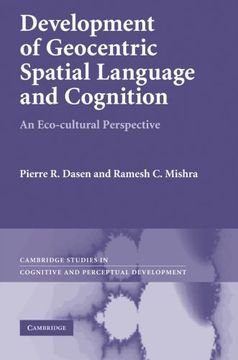Share
Development of Geocentric Spatial Language and Cognition: An Eco-Cultural Perspective. Pierre r. Dasen, Ramesh c. Mishra (Cambridge Studies in Cognitive and Perceptual Development)
Pierre R. Dasen
(Author)
·
Ramesh C. Mishra
(Author)
·
Cambridge University Press
· Paperback
Development of Geocentric Spatial Language and Cognition: An Eco-Cultural Perspective. Pierre r. Dasen, Ramesh c. Mishra (Cambridge Studies in Cognitive and Perceptual Development) - Dasen, Pierre R. ; Mishra, Ramesh C.
Choose the list to add your product or create one New List
✓ Product added successfully to the Wishlist.
Go to My Wishlists
Origin: Spain
(Import costs included in the price)
It will be shipped from our warehouse between
Thursday, June 06 and
Monday, June 17.
You will receive it anywhere in United Kingdom between 1 and 3 business days after shipment.
Synopsis "Development of Geocentric Spatial Language and Cognition: An Eco-Cultural Perspective. Pierre r. Dasen, Ramesh c. Mishra (Cambridge Studies in Cognitive and Perceptual Development)"
Egocentric spatial language uses coordinates in relation to our body to talk about small-scale space ('put the knife on the right of the plate and the fork on the left'), while geocentric spatial language uses geographic coordinates ('put the knife to the east, and the fork to the west'). How do children learn to use geocentric language? And why do geocentric spatial references sound strange in English when they are standard practice in other languages? This book studies child development in Bali, India, Nepal, and Switzerland and explores how children learn to use a geocentric frame both when speaking and performing non-verbal cognitive tasks (such as remembering locations and directions). The authors examine how these skills develop with age, look at the socio-cultural contexts in which the learning takes place, and explore the ecological, cultural, social, and linguistic conditions that favour the use of a geocentric frame of reference.

